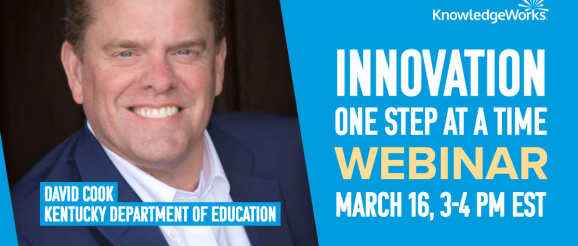Educating Kentucky: Innovation, One Step at a Time – KnowledgeWorks

To explore at that question, David Cook, director of innovative learning at Kentucky Department of Education, joined Jason Swanson, director of strategic foresight at KnowledgeWorks, for a recorded conversation on how Kentucky has been quietly innovating the state’s public education system over the past decade.
The timeline of Kentucky’s journey
Kentucky’s innovative education journey includes key policy, practice and collective impact milestones:
These shifts have helped Kentucky systems adapt to better support students. For instance, in 2010, the idea of planning for remote learning seemed like a novel idea. But when the COVID-19 pandemic started, it was integral to supporting learning and early innovations helped Kentucky respond more quickly to learners’ needs.
United We Learn
Among Kentucky’s most recent efforts to support their learners was a vision refresh in the form of the United We Learn report. The report outlines a vision for the future of learning in Kentucky but on reciprocity and the unique needs of each learning community. It is also notable for the approach to its creation, centering on the voices of communities across Kentucky. This approach also signals a shift taking place in the education leadership approach in the state, moving from designing education from the top down to instead asking people what they need and want from their education systems. This resulted in rich data that was initially reviewed and evaluated by an inclusively created coalition leading to similarly inclusive community-based coalitions.
A key insight Cook shared to making the coalitions work was including kids so that their ideas and visions for the future were included in the conversation. “Young people are the end-user of education,” said Swanson. “They have little power to make decisions for how the system behaves. We need to look at ourselves not as decision-makers on their behalf but as their advocates.”
“In order to have a more equitable, learner-centered environment, we need to understand who kids are,” said Cook. Knowing kids helped facilitate stronger learning experiences for kids during the pandemic and that learning has applications well beyond COVID-19.
The result of the paper and the coalitions: “Kentucky citizens saying, ‘This is what we need,’” said Cook. That means Kentucky’s education strategies are co-created by community members rather than the agency working in a vacuum.
When Swanson asked what Cook would suggest for communities looking to enact deep change like what can be seen in Kentucky, he shared that it has to be a proactive approach instead of simply reacting to events. That starts with a changing your district and school culture to focus on changing for the better instead of always looking back at what was.
“When you talk to the leading districts in this work, they had an easier path back to ‘normalcy’ than others did because before the pandemic hit, they were already doing the work,” said Cook speaking of true innovative culture shifts. “That’s the hardest thing for states, districts and schools because it’s so difficult to maintain a [culture of innovation].”
Watch the webinar
Watch the full conversation to learn more about education innovation in Kentucky:
